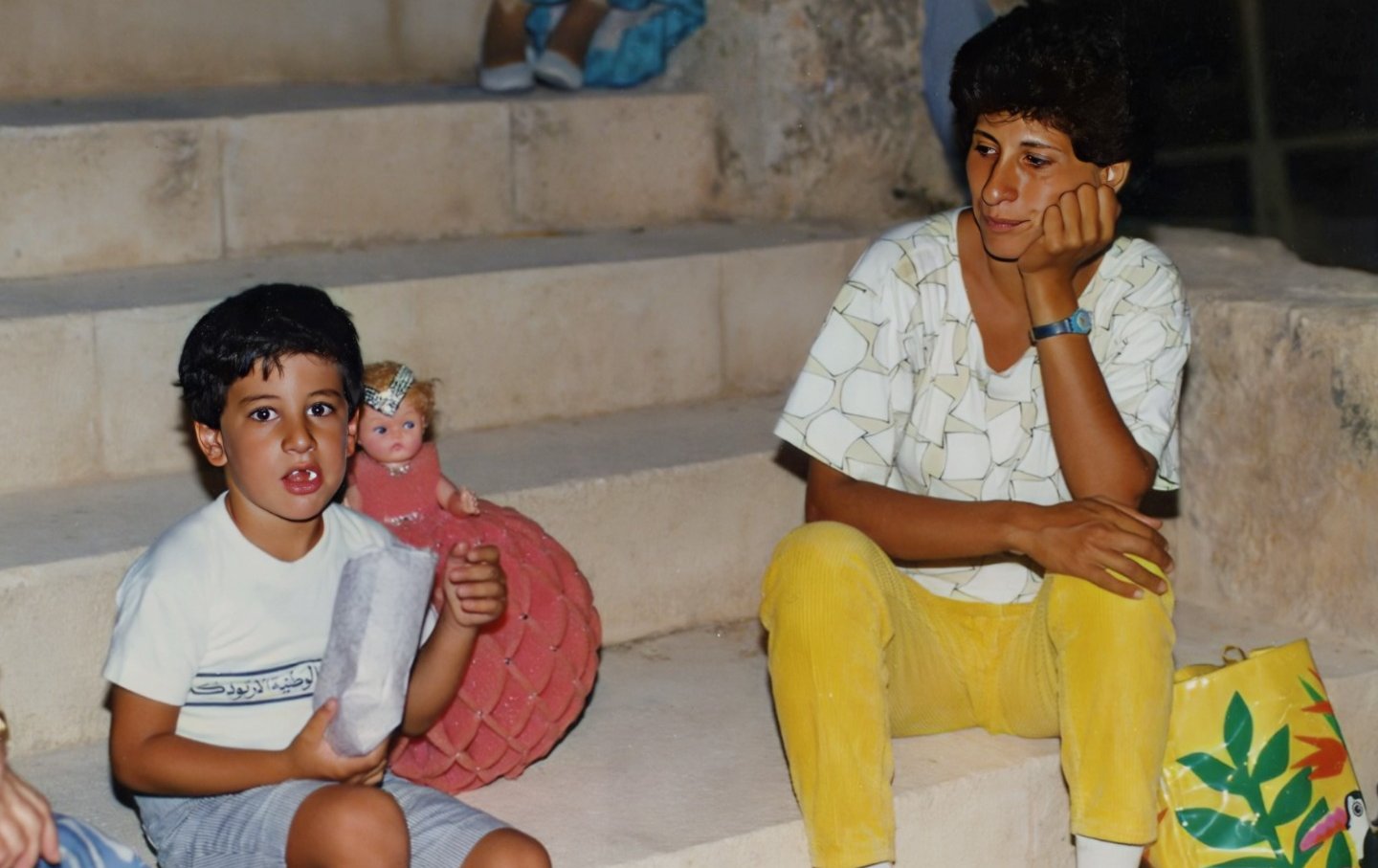The Weekend Read / October 25, 2025
In 1948, my family fled Palestine when Zionists took over. I pieced their story together from a box of letters and diary entries.

The author and his mother.
(Tareq Baconi)
Yalla, Yalla! her father yelled from the bottom of the staircase one evening, “We have to leave, right now!”
Nineteen forty-eight. A shadow—the darkest one—cast over our lives in Amman. I pull my grandma Tata’s diaries out of the weathered yellow box, which is filled with scores of letters; cards received from friends and family; old journals and pads; and paraphernalia that releases childhood smells of sugary sweetness and perfumey paper when opened. The diaries are minimal. Barely anything is divulged from this time, apart from her love for her God. Everything else documents basic events as they transpired, in a clinical and sober tone. A historian’s archive rather than a record of a lived life. Her notes help me make sense of the tales that permeated our early years in Amman—unobtrusive, undemanding—like wallpaper on the back of our consciousness.
I see her, then just a young woman named Eva, standing in her room, shaking, forced out of the stupor of the past few months. The spring afternoon was like every other that year. She had just come back home and was getting ready to help her mother in the kitchen. Her father, the local pastor, had left to go to church for the evening rituals. Everything ticked along as routinely as it always had, even as uncertainty clung to everyone. They were all stuck in a cycle, a relentless interrogation of a decision that had been made, one that had to be remade daily, incessantly.
Tata’s father had decided they would not flee, and that was supposed to be the end of that. Even as more windows in the houses around them shuttered and front gates latched shut. Even as neighbors disappeared into the depths of the night without farewells or promises of reunions. Even as her girlfriend across the road vanished, as if her family had never occupied the two-floor villa on the corner, the one that had already acquired the forlorn look of deserted buildings. She knew her mother was worried, and that the firmer her father was, the more anxious her mother became. “I am the head of the parish, for God’s sake!” he declared repeatedly. He was not going to leave his flock of parishioners behind, no matter how rapidly it diminished. It had taken him two years—ever since they had relocated from Jerusalem to Haifa so he could assume this position—to gain the congregation’s trust. What kind of message would he be sending his flock if he ran away?
“God works in mysterious ways,” he assured them. If God wanted his family to be hurt, he reasoned, there would be a perfectly logical explanation for it. A divine purpose he could not possibly comprehend, let alone challenge. Even though Eva guessed he was as much trying to convince himself as the rest of the family, she was happy with that decision. She did not want to leave. Haifa had just started feeling like home, and she had finally grown to like her high school. Why go anywhere when she only had one year left before graduating?
Still, plans had to be made. Mundane contingencies despite all their heartfelt prayers. Necessary arrangements despite their rock-solid faith. Early in the year, her father had collected everyone’s passports and papers and a few of their valuables and set those aside in a suitcase at the bottom of the stairs, where it rested that morning. In the beginning, Eva did not like looking at the suitcase as she made her way up and down the stairs. It was a reminder, even if subtle, of the times they were living in. But gradually, she had stopped noticing it. The suitcase blended in with the furniture of the house, its violence domesticated. Meanwhile, days unfolded smoothly.
Until spring came round, that is, when the news trickled in with even more urgency from all over Palestine. People whispered on street corners and in cafés around Haifa. The Zionists had mobilized. They were armed and vicious and determined, going from village to village, town to town, killing and raping. Thousands of Palestinians were fleeing. Entire villages were being burned and destroyed. At first, even this failed to puncture Eva’s days. The snippets of nightmarish tales she heard were oddly out of place under the shadow of Mount Carmel, where, every morning, she left her house behind the Italian hospital near the Haifa port and walked the half hour to school. Down the boulevard that led to Wadi al-Nisnas and up the slight incline at the foot of the mountain toward the International Petroleum Company. Maybe she was immune to the tension consuming the adults. Maybe she was unable to live the word hanging in the air around her. But in the breeze of Haifa’s spring, things seemed ordinary.
Regardless of the reason that made her denial so firm, it faltered all the same in the face of Deir Yassin. April 9, 1948—a date frozen in time, tightening its grip on our memory the further back in history it falls. A tranquil village, casually reclining against the hills surrounding the holiest of cities—her family’s city, still her city—made to witness such gore. After the massacre of Deir Yassin, the silence in her mind shattered. How could it not? The stories she heard were horrific, rumors swirling around the city: Boys and girls were paraded and lined up before being shot in front of their parents. A pregnant Palestinian woman had had her stomach sliced open by a Zionist terrorist, the fetus smashed. Grandparents were mocked and beaten to death by militias roaming the streets. The Zionists had wanted a gruesome spectacle, an example to others, people around her were saying.
That night, after news of the massacre reached them, her father turned off the radio in the kitchen and gathered them in the sitting room to pray. Eva stood between her brother and sister, and the five of them held hands. Her father led the prayer, the same one, he told them, that he would recount to his congregation that Sunday. “In these uncertain times,” he said, “we need to put our faith in powers that are greater than us. Our Lord sent His beloved son, His only son, to be tortured and killed for our sins. Such is His love for us humans. Would that same Lord forsake us? It is at times like these, when earthly horrors come up against divine faith that we believers are tested the most. We need to look beyond our fears and anxieties. We need to lay our burdens at His feet, for they are too great for us to bear. ‘Come to me, all you who are weary and burdened, and I will give you rest’—Matthew 11:28.” Eva’s brother squeezed her hand, comforting her. She had been raised a believer, and she trusted in an otherworldly goodness that would protect her family. Barely a couple of weeks later, as she was in her room, she heard the front door shut and knew her father was going to church.
He walked out of the house and turned left toward the city center. Before he had reached Haifa’s main boulevard, the one that separated their neighborhood from the much livelier and more crowded Wadi al-Nisnas, he saw the barricades. The Zionists had arrived. They were erecting barriers across the streets and people were being turned back. There was no longer any access to the city center. Seeing the barriers drew his attention to something else: the sounds of shots descending from the Carmel mountaintop. He had been lost in his own thoughts, oblivious to those noises, thinking them construction sounds or the grunts of the city. Now that he heard them, while looking at this scene in front of him, they sounded ominous.
The feeling of physical confinement hit him with a force that left him suspended, unable to put one foot in front of the other. His mind, which until then had been whirring with messages of faith and conviction, grew still. He was not yet ready to admit what he understood, somewhere in his heart, to be true: That they had to flee. Before that knowledge could sink in, before it could be considered and studied, before an informed decision could be made, instinct took over, and regret, where barely a few seconds prior there had been certainty. Was it too late? Had he left them here for too long? What would they do to his beautiful daughters? His son? He rushed back minutes after leaving and slammed through the front door and into the house. Distraught, he shouted about Haifa being barricaded.
“The port,” he yelled. “The port is the only way out.”
Popular
“swipe left below to view more authors”Swipe →
The fear that had permeated the neighborhood since Deir Yassin suddenly had a face. For all the wavering minds, like her father, the message those massacres sent became clear. The price for staying put was too high. Eva had never seen her father like that. The calm soul, the gentle leader of the parish, the steady patriarch of the family, had gone out the door and returned a few minutes later a primeval shadow of himself. It is a frightful sight to see loved ones reduced to their most basic selves.
“Pack up! Pack up! We’re leaving! Quick!” he screamed, jolting Eva out of her shock and back up to her bedroom.
I see her hands tremble as she reaches for the bible and the crucifix. Her most treasured items. The two objects that made her room in Haifa feel like the one she had left in Jerusalem. What else does one pack when confronted with such madness? Perhaps a week’s worth of clothes. A light sweater, as well, for the morning and evening chill. She would be back long before winter.
“Yalla! Hurry! We’re leaving now!” my great-grandfather shouted from the front door, where he stood with the bag that had long been prepared. The bag was now fulfilling its purpose.
She saw her sister and brother run past her room with a suitcase each, followed by her mother, who rushed in and pulled a few more items of clothes off the hangers and threw them into Eva’s suitcase before slamming it shut. Her mother grabbed her hand without any kindness, Tata would recall years later. No kindness, just haste, she told me, as if that slight was more offensive than the loss of her home. Eva tried to steady herself against her mother’s pull as she exited the house and paused in its jasmine-lined entrance. Just beyond the gate, people were rushing toward the waterfront, their faces contorted. She looked back as her father locked the door and put the keys in his pocket. Oh good, she thought, he’s shuttered the windows.
In the crush, my Tata lost her bearings, and before she knew it, she was huddled between her older brother and sister in a fisherman’s boat. Her hair was chestnut brown then, curly and short, from the old pictures I have seen—now bookmarks in her bible. Her hastily packed suitcase lay by her feet on the wet floor. She looked at all the boats bobbing in the waves around her, and her eyes wandered toward the shore, where the lights of home melted away and those of south Lebanon shimmered in the distance. Lights that were desperately needed and wholly unwanted. A shudder ran through her body as the boat finally docked, and she joined thousands of others spilling out. She started reciting bible verses in her head, she told me, wishing she was anywhere but on that pier. She clutched her mother’s hand after landing, her other holding on to the suitcase with the bible and the crucifix, the same one that hung above my head as I dozed off behind her every afternoon as a child in Amman.
Tareq Baconi
Tareq Baconi is author of Hamas: The Politics of Resistance and policy fellow at al-Shabaka: The Palestinian Policy Network. His new book, Fire in Every Direction, will be published in November by Simon & Schuster.






